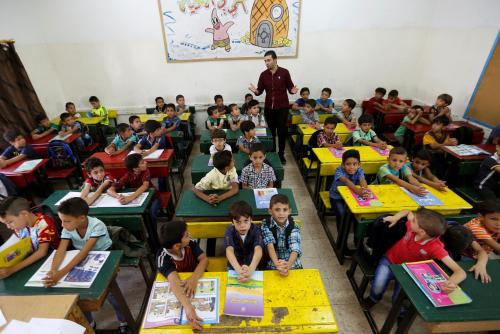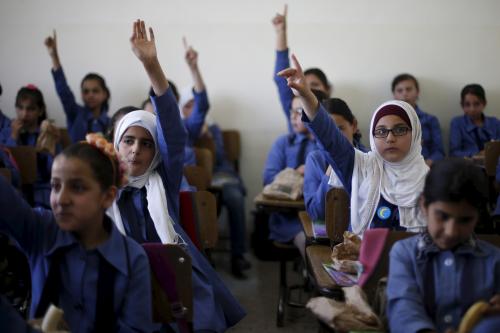This is the fourth blog post in a series reflecting on key scaling-related themes discussed at the global convening of the Millions Learning Real-time Scaling Labs held in July 2019 in Switzerland.
The international development field is dominated by projects—activities to achieve well-defined objectives within a limited timeframe. Projects can have positive impact, but this usually occurs at a small scale and the results sometimes disappear soon after the initiative ends. In other words, it is difficult to scale and sustain the positive impact of stand-alone projects, even though they may be designed to drive sustainable, system-wide change. Policymakers, practitioners, and researchers could all benefit from moving past this “project mentality” to focus on creating and sustaining approaches that serve the entire system.
In my more than 20 years of work in education and higher education and in my current role as general manager of Al Hussein Fund for Excellence, I have seen my fair share of projects come and go. I can think back on many local and regional projects with ambitious objectives that produced considerable short-term benefits but could not scale to comprehensively address an issue. As these projects attempted to grow after the “proof of concept” phase, implementers struggled because they had not taken the steps to lay the foundation for large-scale change from the start.
Why was this the case? And what are the steps or strategies that projects should adopt to plan for scale from the start? In July, I had the chance to participate in a three-day global convening of the Millions Learning Real-time Scaling Labs organized by the Center for Universal Education (CUE) at the Brookings Institution. During the event, representatives from several education initiatives around the world gathered in Feusisberg, Switzerland to discuss key scaling-related challenges and opportunities and to brainstorm ways Real-time Scaling Labs could help address these obstacles. One of the main themes of the workshop was moving past a project mindset to focus on systems change by scaling programs that improve educational opportunities.
During the workshop, I was proud to represent Jordan’s Financial Education Program (FEP), an initiative launched by the Central Bank of Jordan, Ministry of Education (MoE), and a nonprofit Jordanian organization, INJAZ, to mainstream financial education in grades seven through 12 in all public, private, and refugee schools in Jordan. Through the FEP and other related efforts, I have come to believe in the importance of several principles when trying to bring about sustainable, large-scale systems change:
- Promote government ownership: A project is usually planned and implemented by project teams, but the “system” is owned and monitored by the government. To ensure that projects bring about sustainable impact, the government must play a leadership role—particularly when trying to scale an initiative nationally. One effective approach is linking project goals to national priorities. On the FEP, we strategically aligned project goals with those of the national government—in this case, financial literacy and financial stability. In Jordan, financial literacy levels are low, and improving financial literacy has been a key government priority to help advance the economy and promote citizens’ wellbeing. The government does not view the FEP as a parallel project but as an integral strategy to help achieve its goals.
- Embrace multistakeholder collaboration: In addition to strong government leadership, initiatives designed to achieve systems change should include key stakeholders from public, private, and civil society to pool everyone’s resources, assets, and skills. Roles and responsibilities of different actors should be based on their comparative strengths. In the FEP, for example, the MoE monitors program implementation, commercial banks provide financial resources, and civil society organizations help generate community support for program activities. When the FEP was established in 2014, national steering and technical committees were created with representatives from government ministries, INJAZ, and the Association of Commercial Banks to allow different groups to contribute their ideas.
- Build public awareness: An important, but oftentimes overlooked, strategy when trying to promote large-scale systems change is bringing the general public along. The public should be aware of an initiative’s objectives, benefits, and financial and social impact. Promotional messages for the program can be customized to effectively reach certain target groups: As part of Jordan’s National Financial Inclusion Strategy, the government uses TV, radio, and social media channels to update the public on the strategy’s progress and communicate its importance for the country’s future.
- Use real-time data to learn along the way: Scaling involves continuous planning, testing, iterating, and monitoring. On the FEP, before we introduce curricula to a new school grade, INJAZ, the MoE, and the FEP technical committee review and update it. Then, after the curricula is introduced in the classroom, it is reviewed once each year for two years, and student, teacher, parent, and other stakeholder feedback is integrated into the final version. This final version is then handed over to the MoE, and it becomes part of the official government curricula. This process of reviewing and updating based on real-time data helps ensure curricula is contextually relevant.
- Develop a transition strategy: Developing a clear “transition strategy” should happen at the beginning of a project to ensure positive impact continues as the project closes out and the system becomes responsible for sustaining it. Regardless of the specific transition strategy, it is critical that implementers and policymakers both agree upon it and understand their roles. The FEP is currently in the process of gradually transitioning from an NGO-implemented project to one that is managed by the MoE. The terms for this transition have been in place since the project began.
I have always believed in the importance of these principles in large-scale systems change, but the recent workshop in Switzerland helped my colleagues and me articulate these ideas and consider their application. Projects are a good thing, but by focusing on the broader system, we can see more long-term change. Over the next two years, I look forward to working with the Real-time Scaling Lab in Jordan where we will continue identifying opportunities to sustain the positive outcomes of the FEP so that it is not just another program but a fully integrated component of the national system.






Commentary
To create systems change in education, shift away from a ‘project mentality’
August 16, 2019